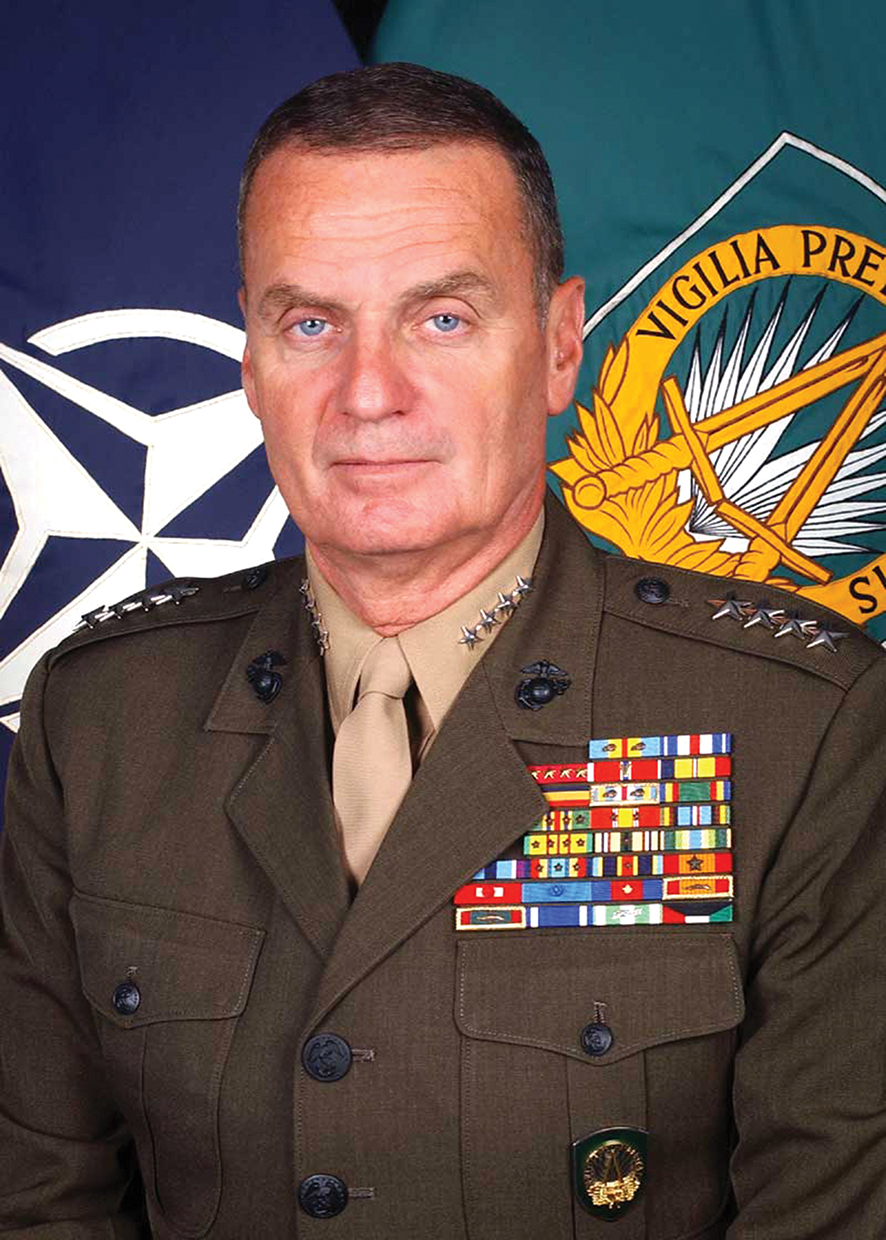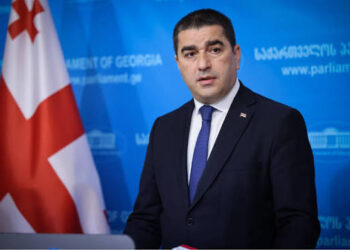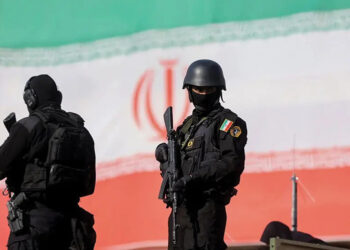It is probably one of the biggest historical blunders that any leader has made when Vladimir Putin decided to invade [Ukraine], – Former NATO Supreme Allied Commander, General Jim Jones tells Radio Free Europe/RL’s Georgian Service. “And we might never know why, what prompted the decision, but I think he, like all dictators, listens to people who echo his own views. I think that he saw the unfortunate withdrawal from Afghanistan as an indication that the United States would not be happy about an invasion, but they would believe that the war would be over very quickly. And eventually, like the annexation of Crimea, that this would become a fait accompli very quickly. Unfortunately for him, he was sadly mistaken.”
How would you describe the situation on the battlefield right now?
I don’t think there’s any clear picture right now. The Ukrainian counter-offensive was unfortunately lacking in one key element, and that’s air power. And then the Russians had plenty of time to mine the areas where they thought the Ukrainians would advance, and it just caused everything to slow down. But one thing is clear: that Mr. Putin’s ambition to take over Ukraine in its entirety is not going to happen.
How this ends is really important in terms of the perceptions that are going to reverberate around the world, affecting how many countries will then choose to behave
Is a decisive battleground victory still feasible for either side?
I don’t know the answer to that. It doesn’t look like it, although I think the stated ambitions on both sides have not changed all that much. But if you look at what’s going on on the ground right now, I don’t see a definitive advantage on either side, except for the fact that there’s pretty much no doubt that Russia will not be successful in taking over Ukraine as a country. I think it’s extremely important on almost a global basis that how this ends has to be seen as a victory for Ukraine and a defeat for Russia. I don’t know what that looks like, but I’m pretty convinced that it has to end that way, because if it doesn’t, the autocrats of the world will be emboldened. I would think that the President of China would rethink his position with regard to Taiwan perhaps. And if Vladimir Putin is re-admitted to the family of national leaders, to the international meetings, as though nothing happened, that would be the worst outcome. He’s an indicted war criminal by the ICC, and that should stand for something. But how this ends, I think, is really, really important in terms of the perceptions that are going to reverberate all over the world and will cause many countries to behave differently one way or the other.

The Russians are launching another offensive at Avdiivka. Weren’t they supposed to be depleted to a degree as to be unable to mount another massive offensive?
I think one thing that was always clear is that the Russian leader was willing to commit whatever manpower he needed to, because they outnumber the Ukrainians in terms of population and in their ability to launch a major offensive. I think that his ability to draft young men and throw them into the Russian army, even though they’re fairly poorly trained, is something that you have to take into account. It’s good to have enough manpower, it’s another problem to have qualified manpower that is trained, organized and equipped to do the job. And the first year of the war, Ukraine was more on the defensive, which is much easier in terms of manpower losses. And then the second year, Ukraine wanted to go on the offensive. But they also found out that if you don’t go on the offensive with at least a three to four or five to one ratio, you’re going to take more casualties. And the fact that they were fighting a combined arms war without one of the key elements, which is air power, that slowed things down. I think the needed air power is on the way, but it’s not going to be ready to go for quite a while. Once they get that, they can really complete that combined arms capability, for which they do have great comprehension. But they need to get it all together before they can really start making a difference.
If you’re going to fight a war, you need to fight a war to win, and you need to have the equipment that you need to prevail
General Zaluzhny in The Economist, said: “If you look at NATO’s textbook and at the math, four months should have been enough to reach Crimea, fight in Crimea, return from Crimea and to have gone back in and out again.” Were the Western military forecasts wrong, or did Ukraine underperform?
Generally speaking, it would have been better for the allies to provide the equipment that Ukraine needed to prosecute a more effective campaign, especially when they tried to go on the offense. The US was complicit in not providing the weapons rapidly enough, particularly the F-16s. We were too cautious about not giving the Ukrainians weapons that could strike into Russia, essentially causing them to have to fight the war with one hand tied behind their backs. But I think people realize that now, and the supply chains are better, the equipment is arriving at a faster rate. We’ll have to wait and see. But the big missing piece is aviation. When they get the air power they need, it’ll make a difference.
Zaluzhny noted they’re at stalemate, but said he doesn’t see the combined arms maneuver as a solution: he is betting on technological advancement. Where does this leave us when it comes to the Ukraine war?
You’ll get the first indication of where that leaves us in February at the Munich Security Conference, which I’m sure will be dominated by the Ukraine-Russia conflict. I was there last year, and many words spoken by political leaders were very encouraging. Like, “we’re with you until the end.” So it’ll be interesting to see what the dialogue is this year, whether there’s donor fatigue out there, and I think Mr. Putin is certainly counting on the fact that he can outlast the West. Because the West is always wanting to end wars quickly, to do whatever you have to do.
Ukraine understands that without airpower, the manpower bill goes up exponentially. They can’t afford the Putin doctrine, just throwing men at the problem
One year ago, we saw the impact of HIMARS on the battlefield. Will there be an ATACMS or F-16 era too?
I think so. The military advice here in Washington would be to provide for that. But politically, there is fear in the capitals that if you give the Ukrainians the weapons that can strike into Russia, then they will do so, and it might cause a wider war. I don’t think that’s correct, to be honest with you. My first war was in Vietnam, and I was always frustrated by the fact that we couldn’t pursue the enemy into Laos or Cambodia, or north of the DMZ, and there was so many restrictions on us that we did have the impression that we’re fighting with one hand tied behind our back, and I think that’s a risky strategy that normally contributes to defeat of the one side that has had so many impositions on it. The fear, obviously, is that Vladimir Putin will escalate to a nuclear conflict. And everybody’s concerned about that. But I do think that the important thing is to give the Ukrainians the panoply of weapons they need, and to certainly prevent Russia from advancing any further into Ukraine.
So should we expect more, better, longer range ATACMS? And what’s that dependent upon?
The military advice here is that they want to give them longer ranges. I’m not sure where the political leadership is on that. But you know, if you’re going to fight a war, you need to fight a war to win. And you need to have the equipment that you need to prevail. Otherwise, you’re working towards a stalemate, and that’s not very good for anybody.
Let’s look at this from Zaluzhny’s perspective: You are a general, you have to conduct a counter-offensive, and you are asked by your partners on whom you are heavily dependent on in your war efforts to go into it without air support. How does it feel?
Not good. You know, in my days in Vietnam, we always had adequate air power, be it gunships or Phantoms- the North Vietnamese that we fought against did not have that. And they paid a heavy price militarily, regardless of how it worked out politically, and I think that Ukraine understands that without airpower, the manpower bill goes up exponentially. So you have to be very careful, because for Ukraine, manpower is really important. And they can’t afford the Putin doctrine, which is just throwing men at the problem. He doesn’t care. They do.
With all this taken into account, what can be done now? In Poker terms, what hand has the West got and how is it being played?
Well, the list of things they don’t have needs to be shortened. Aviation is the big missing piece. The land offensive was stymied by the amount of time the Russians had to prepare the field with mines and fortifications that make it much harder for the Ukrainians to achieve massive success, especially if they’re trying to do so without airpower.
NATO deserves a lot of credit. The defense of Europe is now a valid concept
On the positive side, though, one of the good things is the resurgence of NATO. I think NATO deserves a lot of credit. The defense of Europe is now a valid concept. We know what that is, and we know where the line of defense is, for the defense of Europe and protection of other countries like Georgia, Moldova, and others. And if we’re able to limit Russia’s advance to what it is now, if that becomes a negotiating position, then I think the West will be able to say that they prevailed. And the battle between the autocracies and the democracies and other parts of the world will probably have a different outcome.
So that would be partial victory, but still a Ukrainian victory.
Right.
Since the war started, we’ve seen profound changes in Russia’s neighborhood – Finland and Sweden going to NATO, Moldova aligned with the West, Azerbaijan reclaiming Karabakh, and Armenia drifting from Russia and getting arms deliveries from France and India. What’s your advice to Georgia in these troubled times?
I think the closer the countries are to the threat posed by Mr. Putin and Russia, the more the relationship with NATO becomes important. NATO needs to reach out to those countries that are at risk and lend a hand towards explaining to them what it takes to become a NATO member. And frankly, I think, the Ukrainians should be doing the things to prepare for NATO accession that they can do right now, so they don’t have to wait another couple of years. There’s a lot of work that can be done right now to reassure the people of those at-risk countries that the NATO embrace is out there. And they should be doing things that they can do now to shorten the time between where we are now and eventual accession to NATO. At the end of the day, Russia has to be convinced that this was a mistake and, secondly, that NATO is going to be many times stronger and more capable than it was before the invasion. And that there is a line of defense for the defense of Europe, and countries like Georgia and others will probably be on it at some point.
Interview by Vazha Tavberidze














